Clark Kelly Price, The Rich Poor Man, 2024, print
Substack is great for loose themes. Posts can be short and stand alone while building understanding of something bigger. The last one thought about status and the SSH from the perspective of a troubled Alpha. The lesson is SSH is constant while social status is contextual. The same as when a Gamma like Neil Gaiman attains high status in his circles but still goes out in a Gamma flambé. And that brings up another pair that are related but apply to social behavior differently. Social status as I’ve defined it here and social class. Class did come up in in passing an earlier post. A closer look at the limits is worthwhile for anyone interested in Observe, Read React-type social processes. We know ORR can’t change SSH status.1 It can’t change class either.
Thomas Cole, The Ages of Life: Youth, 1842, oil on canvas, National Gallery of Art
Personal anecdote. College “reinvention” is like “fake it until you make it” - a useful situational process Gamma’d into cringe. What matters is intention. Behavior can be altered by consciously doing different if there’s a real desire to change. Repetition → habituation. That’s not failing transparently at something you aren’t. Likewise, college is a blank slate in that you’re unknown. Not someone new. Trying to be someone else by acting out a fantasy character is guaranteed disaster. What isn’t there is the timeless NUC baggage from earlier, less adroit phases of life.2 For me, school was 12 years of often-awkwardly figuring it out. Still hopelessly naïve in hindsight, but lightyears from the bewildered kid that started the process. Now I was free of the boomer specter and had a path of self-improvement in mind. And it was perfect for ORR. A closed ecosystem with common social frames of reference to read and navigate.
But enough variance in personality and background to teach me the difference between status and class.
Miriam Ellis, Tolkien and Lewis on Addison's Walk, 1931, oil on canvas
Special boy colleges were socially stunted during the “meritocratic” era. Assume they still are, but not exactly an engaged alumnus so who knows. I had somehow talked myself into some sort of Lewis & Tolkien era Oxford culture in a bucolic Dead Poet’s Society setting. As an aside, [not socially intuitive] isn’t exaggeration or a little social anxiety. If it’s outside my frame of reference, I’m functionally retarded. Learning disability tier. Anyhow, It was nothing at all like I hoped. Culture shock may have been catalyst behind finally realizing the system was fake. It turned out “fun cool nerds” were a Pedowood trope. And that IRL, obsessive parental molding, pressure, and projected ambition gelds social development. Posturing abounded on levels I had never even considered. As did social class. There were poseurs and snobs in the NUC, so the types were familiar. But the degree was shocking in the way it is when a new reality rips open some unconscious assumption about the world.
There were some advantages to a low social bar. And I got lucky with what was repeatedly described as an anomalous personality mix. Or I somehow drew it out. Probably some of both. In SMV terms, the relative scarcity of attractive females was tempered a bit by the relative scarcity cool males. And it was a brief entanglement with one of the few legitimately striking girls in the year below that taught the class/ status difference.
She was from a big money Pedowood family with name connections. I came from the NUC. Which sounds like the set-up for a Pedowood script, but those are Gamma projection. The class divide was too much. It was a different culture, and I could ORR through specific events, but couldn’t operate there over time. The confident irreverence that stood out as an attractor in the collegiate context involved triumphs like finagling a free pitcher. Skiing in Vail? Last time I’d skied was in jeans and a day of comedy ensued. Conversely, so many of her assumptions seemed hollow, contrived and retarded. It just didn’t work socially. And we both saw it. After a few months, we sort of drifted apart. Stayed friendly, but nothing more.
Edward Lamson Henry, Capital and Labor, 1881, oil on canvas, New York Historical Society
Clarify. The issue had nothing to do with status in the immediate social context. I attracted a top-tier female and started a relationship. But class is a different thing. Also hierarchical and contextual but not the same. In the West, it had to do with family lines - aristocratic bloodlines being tied to rulership and resource ownership. They develop their own organic culture different from the rural or town locals. Intended to differentiate them from the locals. Money was central - participating is expensive. And a host of complex social patterns and customs defined in or out. It’s what happens when people are freed from hours of daily work and home management to focus on exclusive culture. It’s also a universal impulse. Every elite developed a refined “courtly” or aristocratic culture. When the Persian ambassador arrived in the Imperial court of China or the closed world of Venetian elites, he might not know exactly all the complex rituals. But he knew there’d be complex rituals to learn.
Villagers Paying Homage to a Man and his Family Seated on a Garlanded Verandah, c.1585, Mughal watercolor
In a class-conscious society, class is a form of status in mixed class company. Any bibliophile in the Anglosphere has read countless tales of stolid yokels forehead knuckling and milording because a minor baronet entered the room. This links class to value as a person. The term “quality” used to be used for a high class individual. Can’t emphasize enough it’s quality without any basis in morality or accomplishment. But the associations are powerful enough to still hang around. We see it in elite disdain for the little people. And while there is more of a trash monoculture and the formal aristocracy isn’t a social thing, class distinctions are hard as ever. Within your class, it’s the context where social status and SSH play out. SSH is innate personality profile. Status is carriage, attitude, capability, charisma, appearance, etc. You can carry yourself with a high status manner in any social context. Your SSH profile will be the same in any social context. But the contexts you have access to depend on class.
James Ward, The Rocking Horse, 1793, mezzotint
Modern class still is economic based. There are costs to participation in certain circles. In my case, I lacked upper class resources. In the fallen Alpha’s case in the last post, lack of class markers pushed him into lower social circles. There is some ability to leverage social skills into an amplifier, but it’s limited. The other interesting observation is that moving down is easy. Alpha could be the king of the rooming house. The rooming house guys weren’t running with us in our prime. And when Malibu Stacy was hanging out with me and my friends, she had the expected impact of a poised, well turned out hot girl. Entirely appearance and carriage, not area code or bank account. There were no socio-economic barriers to hanging out normally. So class is contextual like status, but more or less fixed like SSH. You can improve status with better habits and self-care. Changing social class is much much rarer. The point is that class envy is as retarded as SSH envy. Accept it. It’s part of the reality that has to be navigated.
These are rough distinctions. Lots of rich boors and polite poorer folks. There is overlap. “Classy” derives from the social habits of higher class people. Again, lots of exceptions, but the norms were traditionally more refined and less histrionic. Also traits that are pleasant to be around. It’s not necessary to LARP as rich to elevate status by adding a touch of class. At least to have on call when needed.
One bit of old time high class behavior anyone can use is reserve. It’s essential for ORR - reserve buys time to assess before committing to social action. And it also impacts your social status. Keeping it close to the vest instantly separates you from all the performers, poseurs, try-hards, etc. Low status people don’t seem to realize how transparent and irritating try-hards are. Especially in that low status vortex of sadness where they’re trying hard to out try-hard each other. Presumably cuing off each other and not the high status object of their affections.
Enoch Wood Perry, Talking It Over, 1872, oil on canvas
Inappropriately talkative is a failsafe low status indicator. There’s a SSH dimension as well. The most imposing Alpha tends to be the man of few words, but when he talks everyone listens. The most appealing Sigma tends to be the strong silent type. Senior, respected high Deltas are often very taciturn. Contrast this with low Deltas blathering about task-specific minutia, Gammas posturing, smart boying, or wall o’ texting, or Omagas with no idea when to stop in those rare times someone showed interest.
In the end it’s self and situational awareness. Knowing when something isn’t working, no matter how much you might want otherwise is important. Moving on avoids getting weird or hung up. I realize that’s easily said. It’s also true. I do have one that actually does still burn a little. Probably always will. So what? I never bring it up, and scars add character - so long as you don’t blather about them. Because class may be something we’re stuck with, but anyone can be a little classier. Holding the self to a higher standard - not settling for base or weak - is an act of self-respect. And self-respect is a pillar of high status.
Jordan Henderson, Sanity, Her Son, and the Credulous, 2020, oil on canvas
Beyond helping graduate Gamma, as per the excellent Sigma Game posts. And not because of any special properties it possesses. Any technique that aids objective self and situational awareness will help.
Non-Urban Continuum of later 70s-80s ordinary life in rural, small town, small city, and outer exurb environments.




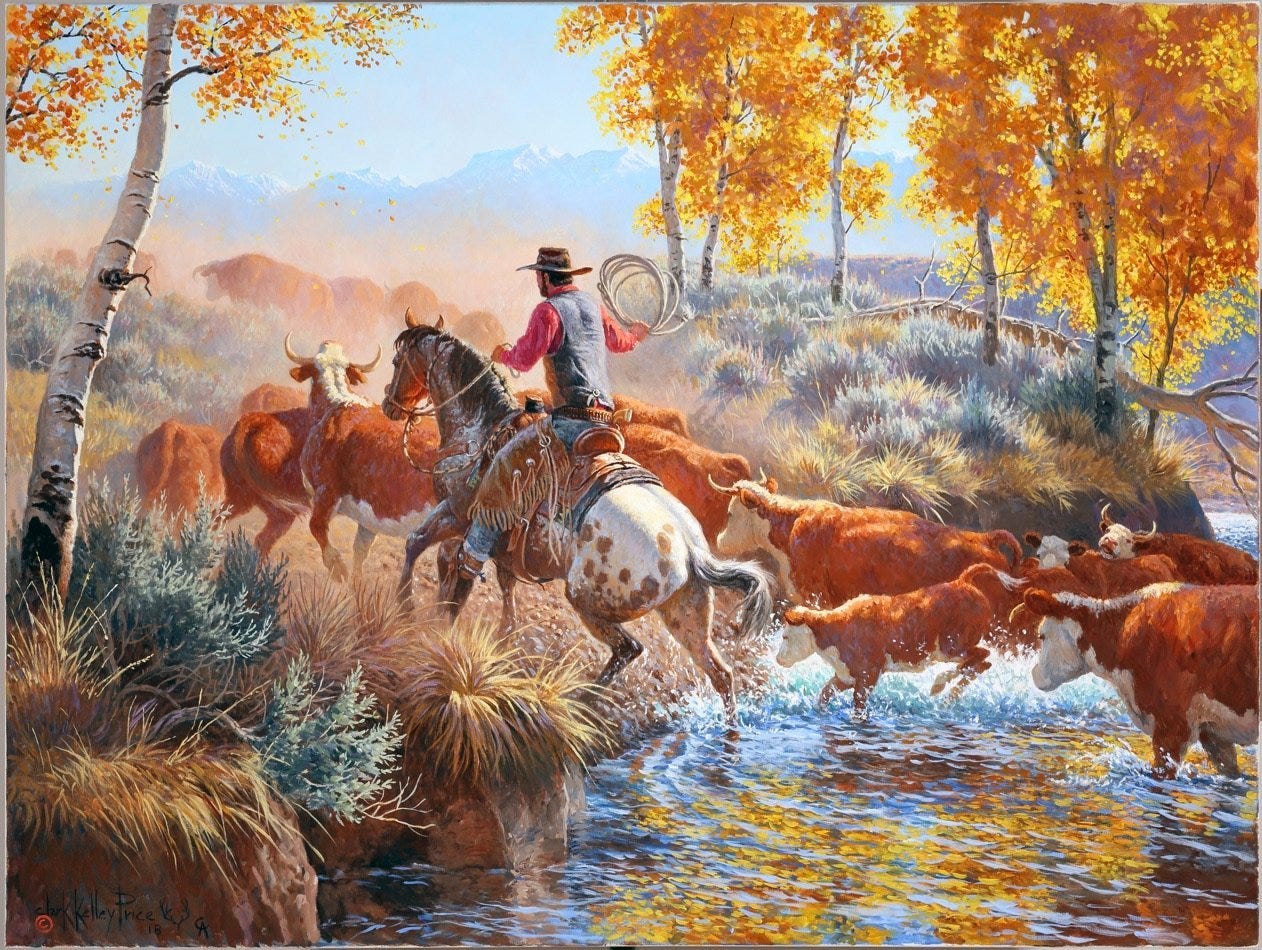

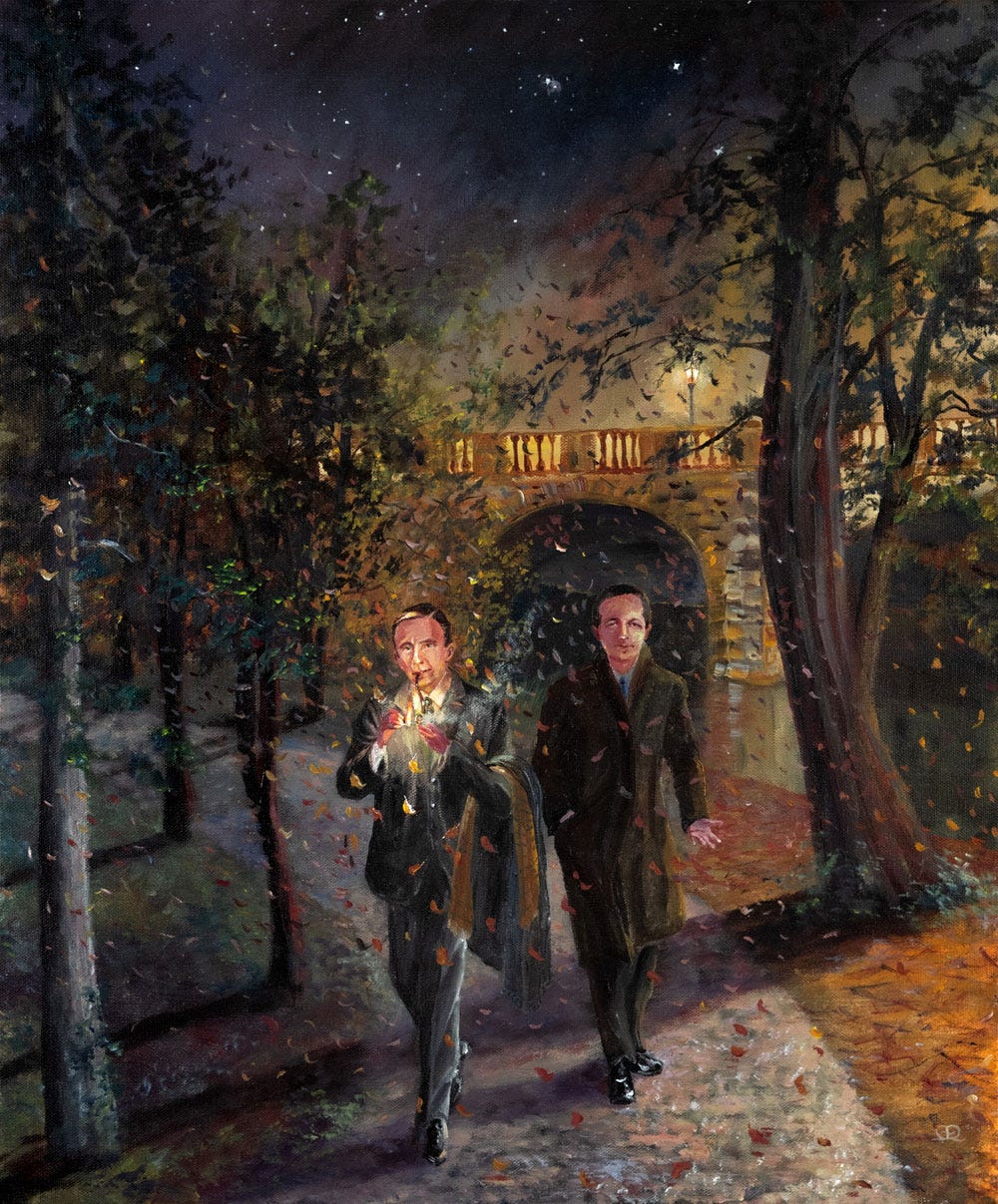

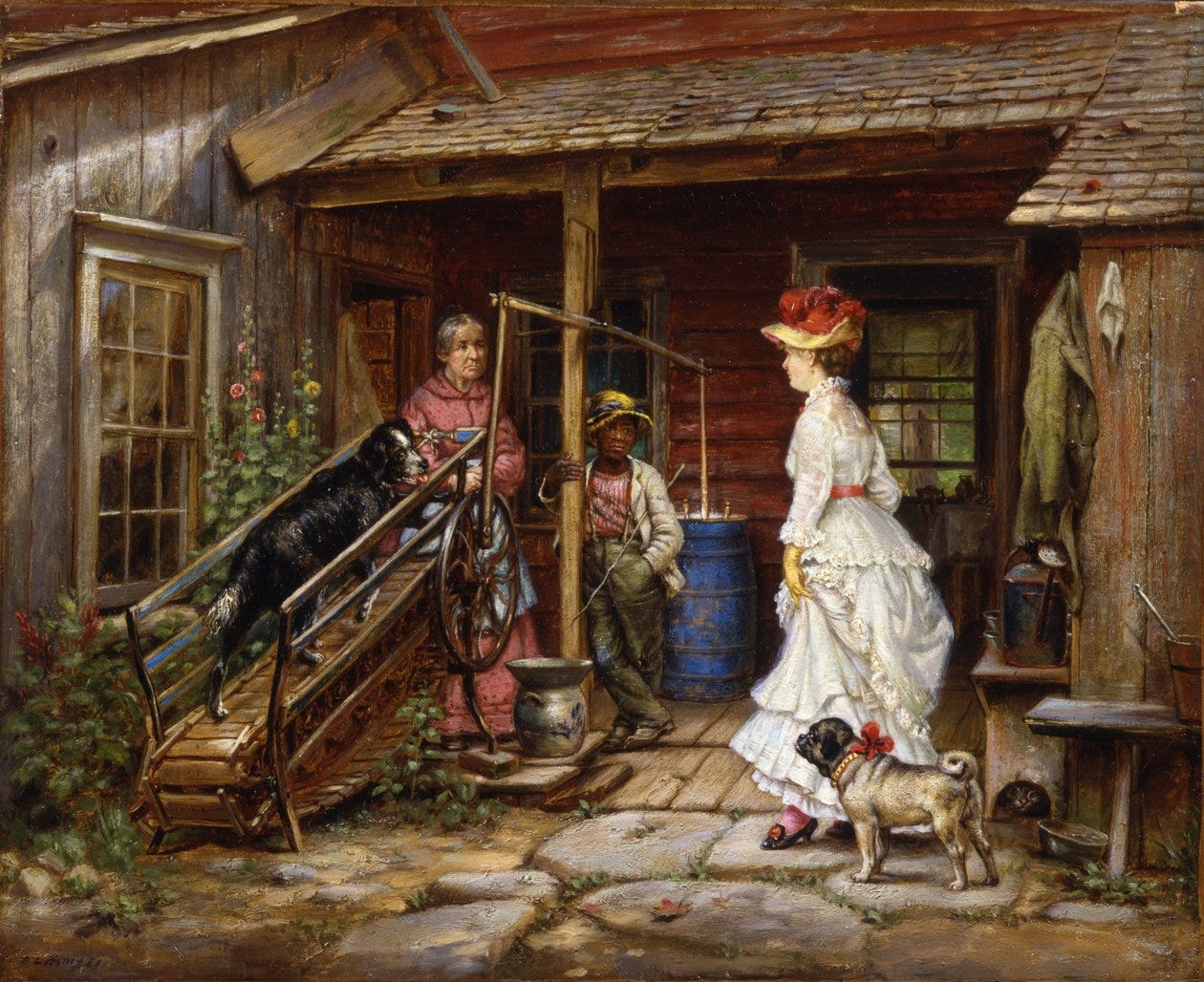
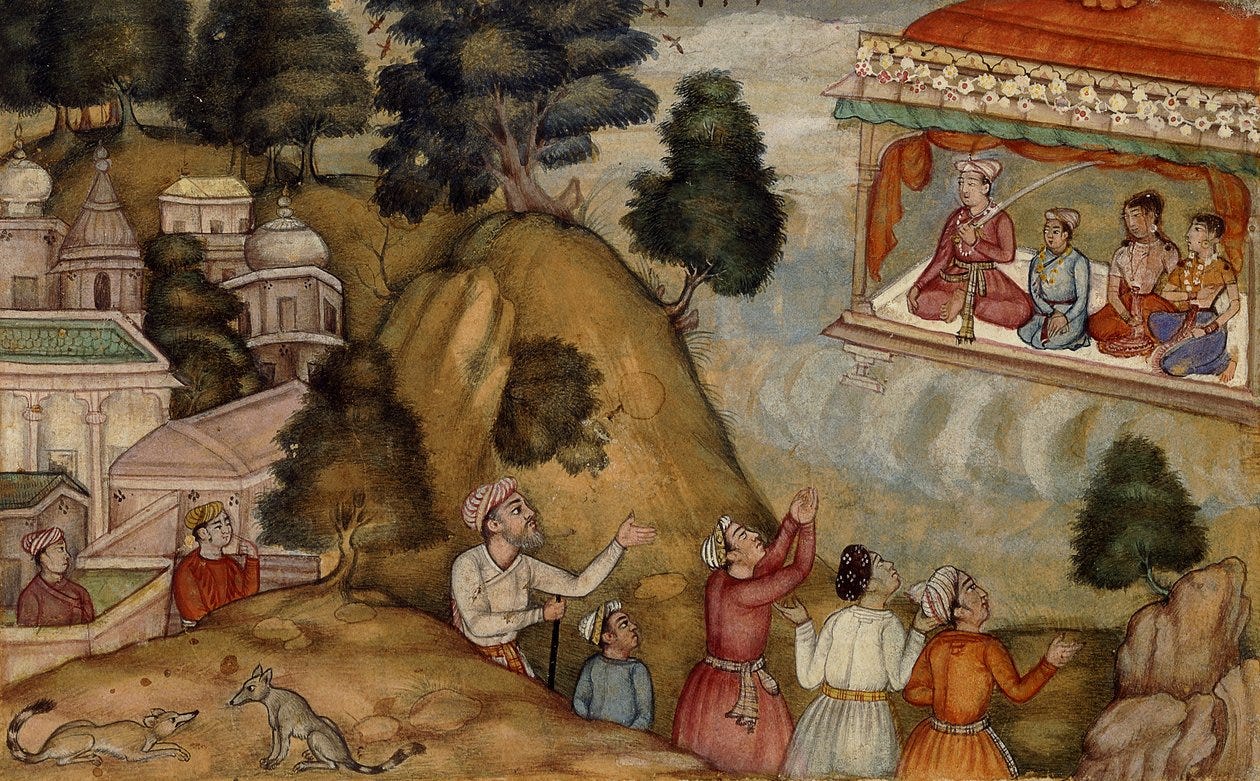


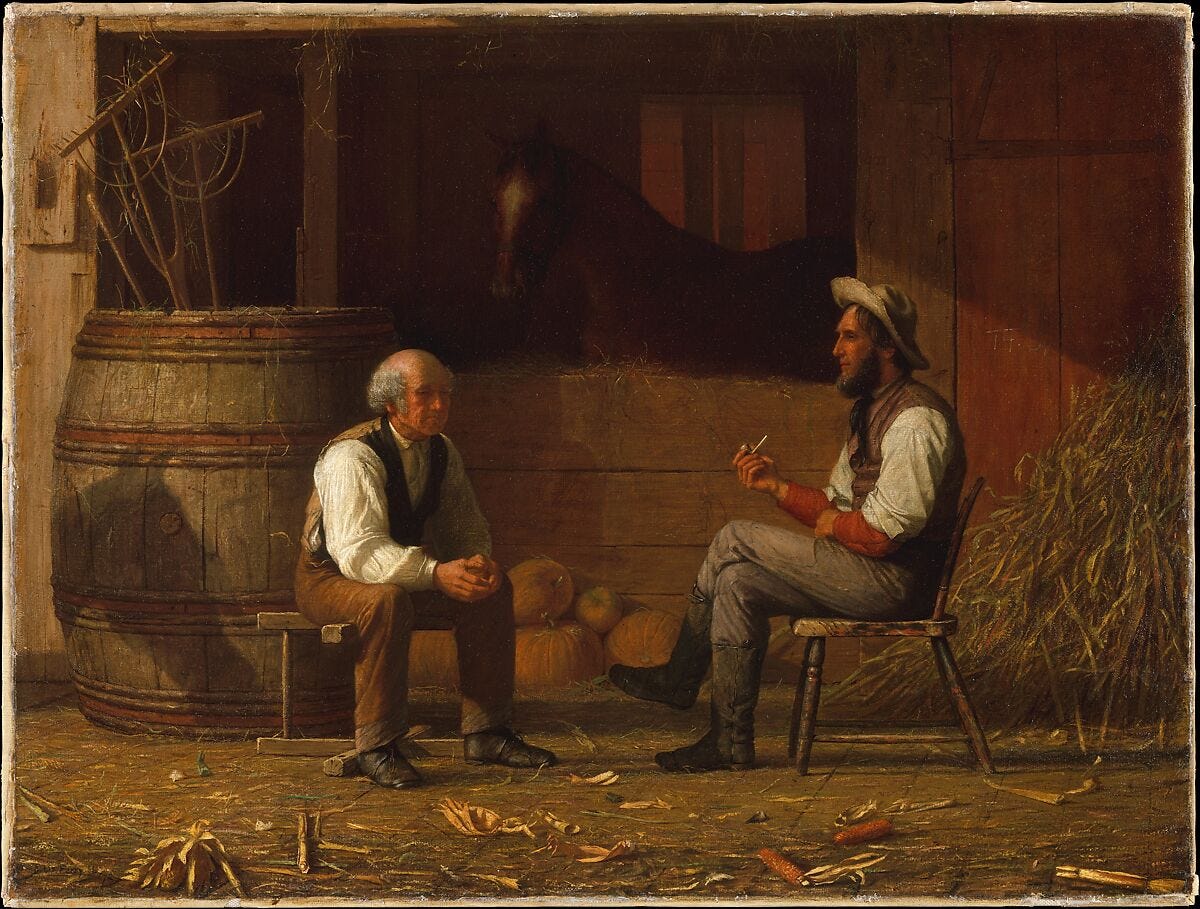
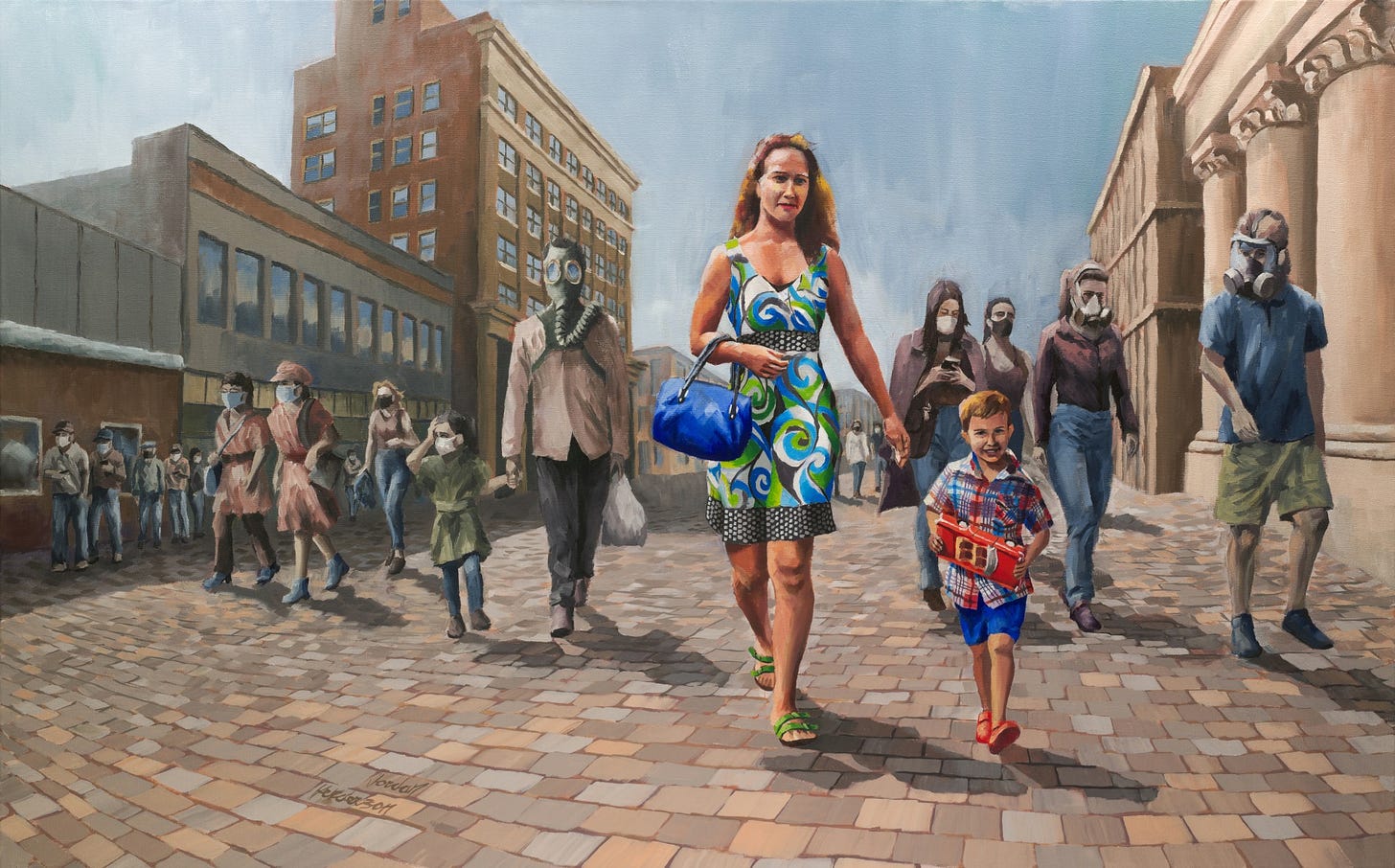
North American society pretends to be egalitarian, less so these days, but many people don't understand how significant an effect class has on social life.
"There is some ability to leverage social skills into an amplifier, but it’s limited. The other interesting observation is that moving down is easy. "
Moving down is definitely the easier path. I live in a small, mostly working class rural hamlet. The "old money" hereabouts are the generational farmers who didn't subdivide the family farms and are now sitting on enormous tracts of real estate. They're still working class in their behaviour though. A couple of my friends labelled me the Redneck Debutante. Despite vast differences in our upbringing, I fit in well with the country folk who are my neighbours. I have much more trouble with the citiots, the new money arrivistes from the metropolises who try to throw their weight around.
I think trying to learn the unwritten rules you need to climb up the social classes is difficult and painful. I know a gentleman who put himself through the top private boy's school, then an elite university, then med school, all on full scholarships. He tried very, very hard to learn the ways of his classmates, studying, ORR-ing, reading Emily Post and Miss Manners, the works. He was very good, but there was an uncanny valley aspect to his behaviour, things that just weren't quite right. His wife, who came from one of the elite families, tried to help him and he resented her terribly. His children, who were steeped in that milieu from birth, mocked his social blunders. He was never really happy in his assumed class, but he was desperate to escape his origins. It was interesting, and terribly sad, to watch.
The existence of both SSH and class distinctions should be comforting to most people, yet it becomes this intimidating obstacle to some. Your recommendation to focus on "be classier" rather than try to change your class as the goal carries the day for me. You can step up the standards where you are and benefit both you and some of those interacting with you. These incremental changes are powerful.